- Home
- Courtney Milan
Midnight Scandals Page 2
Midnight Scandals Read online
Page 2
He bowed. “Mrs. Temple. Good morning to you.”
The woman had the most angelic smile he’d ever seen. “Portia, my dear. Might I have a word?”
Chapter Two
IN THE FRONT PARLOR, Portia stood with her back to the fireplace and smiled at her sister-in-law. Until recently, she’d not needed the ability to feign a smile or good cheer or any other mood. She was learning that most useful skill, though at times she feared the effort would turn her into a completely different person. Alone, she was Portia. Around Eleanor, she was another woman entirely. A false Portia. A Portia without truth.
Eleanor had stopped by the desk where Portia used to sit when she did the household accounts. The household accounts were now Eleanor’s domain. Her sister-in-law perched on the edge of the chair and, one hand on her lap, tapped a finger on the blotter. She gazed at Portia with an open, guileless concern that made her heart break.
“Yes?” Portia looked at the chair nearest the desk and decided she didn’t dare sit. She wasn’t good at interpreting Eleanor’s sighs and silences, though it was safe to assume Eleanor would be heartbreakingly disappointed when Portia failed to divine what was expected of her from all the things she did not say.
Her brother’s wife was generous and kind and assiduous in managing Magnus’s household, and she loved Magnus. She lived for Magnus, and Portia adored Eleanor for loving her brother with such honesty. And yet, other than Magnus, they had nothing in common. Their minds, their interests, did not intersect at any point, and she felt guilty for her failure to genuinely like Eleanor.
The finger tapping continued. “Dear, dear Portia.”
She smiled despite her dread of the conversation to come.
“What are we to do about you?”
“Nothing.” She managed, she hoped, to keep a pleasant expression. Her stomach contracted into a painful lump. “I am content as I am, you know.”
“But, Portia, my dear.” Eleanor tapped the lump that was Portia’s gardening gloves. “You might be brilliant, you know.”
She maintained her smile for, alas, Eleanor meant socially brilliant. Brilliant in fashion.
“You’ve led a sheltered life here at Doyle’s Grange. You do not see things as I do.” She cocked her head. “If only Magnus had brought you to London. In time, you would have sparkled. I am convinced you would have had a dozen beaus. Some gentlemen prefer a quiet woman such as you are, though I think if you had ever been to London, you would have come out of your shell. I’ve seen you smile, my dearest sister, and I cannot believe there is not a young gentleman of exemplary manners and family who would not see you smile and fall instantly in love.”
“I do not wish to have a dozen beaus or to dance away the night.”
“You are not too old to marry well. Imagine the good you would do your brother if you did.” She bent toward Portia, so earnest and mistaken. “Our connection to Lord Northword might be of great assistance in that.”
“Magnus cannot afford to send me to London so that I may dance with gentlemen who do not suit me. Particularly when I have already found a man who does.” She folded her hands together and struggled to match Eleanor’s cheerful concern. “I’m sure you did not bring me here to talk of this.” She smiled brightly. “Is there something I may assist you with? The household accounts, perhaps?”
Eleanor blinked rapidly and Portia felt horrible for her relief at diverting the conversation from the subject of suitable husbands. “What good fortune it is to have you for my sister. Without your kindness, I’d have a far more difficult time. Your brother, too, appreciates all that you do here.”
“How may I be of help?” She was not safely off the shoal yet. The most innocent remark or expression might send Eleanor’s mind reeling off toward ballrooms and dancing.
“If I may be honest—”
“Please.”
“It’s not so much what you may do, but what you ought not do and say. Especially if we are to engage Lord Northword’s assistance.”
“Oh?” This, too, was familiar territory.
Her sister-in-law’s lips set in a grim line. “I should hate for anyone to take offense when I know you do not mean to offend.”
“Indeed?”
“I know you will feel the same when I tell you this. I think that, living here as you have all your life, you are not aware of certain expectations.”
“Indeed, I hope not to offend anyone. Have I?” She did not hide her surprise, nor her concern, for if Eleanor, who was made of all that was light and sweet, thought she might have offended anyone, she may well have done so.
Eleanor intertwined her fingers. By now, Portia knew better than to think her distress would last beyond the next twenty minutes, but it was impossible not to feel the cruelty of allowing anything to beset her. Her sister-in-law lived so deeply in her emotions that it was probably for the best they never lasted for long. “You mustn’t be so familiar with Lord Northword.”
Portia clasped her hands behind her back. “You think I am?”
“You know I adore you and think the world of you.” Her puppy-eyes softened, and Portia’s heart fell at the possibility that Eleanor was about to lose track of their conversation again. “You did wonders before I came here. Looking after Magnus and the house.”
“Thank you.”
The corner of Eleanor’s mouth twitched down. “But, Portia, my dear, Lord Northword is a nobleman. A viscount.” She leaned forward. “The head of an illustrious and very old family.”
“I am aware.” As if she didn’t know.
“I thought my heart would stop when I overheard you call him by his Christian name.” She patted her chest as if she suffered still. “The proper style, the dignified style, is either my lord, or Lord Northword or, so as not to repeat oneself too often, sir. You would know this if you had ever been to London as I have. If your circle of acquaintance included men such as Lord Northword. Men who, I assure you, would not be as tolerant as he. Was there ever a man so forgiving? Besides Magnus.” Her mouth firmed. “I think not.”
She mentally counted to five. “The mistake is mine, of course. It’s just that I’ve always called him Crispin.”
Eleanor gave a frustrated sigh. “But, my dearest. Portia. How can I explain this? All our plans depend upon Lord Northword wishing to do you a service.”
“What plans do you mean?”
“He is your brother’s patron.” She wrung her hands, and even Portia, who wasn’t inclined to think much of helpless women, felt that familiar tug on her emotions that made her wonder if Eleanor hadn’t hit on precisely the behavior that ensured she would always come away with what she wanted. How could anyone bear to see Eleanor unhappy? “If we are to succeed, you must show him the respect due a man of his rank and influence.”
“You’re quite right.”
Eleanor straightened. “I am so glad you understand. He knows you do not intend to insult his dignity. He is a gentleman, after all. A nobleman. But I assure you, he feels it here.” She touched the middle of her chest again. “Naturally, he’s happy about your engagement, but he’s here in support of Magnus as he steps more fully into his position in West Aubry. He’ll want to see how the improvements at the church are progressing.”
“Yes, Eleanor.” It had been a shock when Crispin arrived at the Grange, despite her knowing he was to visit. No longer a married man. A widower. He’d walked in, and her heart had somersaulted in her chest with the same thrill as always. The years fell away to leave her with bare emotion despite knowing that aspect of their acquaintance was over. Over. Over and over. He was a man of the world now. He had been another woman’s husband.
“In London, among the Ton, others will misunderstand your familiarity and think you uncouth. Nothing could be further from the truth. For all that you have red hair and make no effort to improve yourself, we will make a success of you. I promise you. Honestly, my dear sister, if only your hair were walnut brown, I am convinced you would have a dozen more admirers.”
“I’m pleased with the one I have.”
“If you won’t do anything about your hair, you really ought to follow my advice as to your wardrobe. When I was in London, everyone wanted to know the name of my modiste. Everyone! Twice I had to intervene when other ladies tried to hire away Bridget.”
“Thank you, but I do not wish to go to London.” My God. They were back to London and the inadequacies of her dress, yet another familiar topic between them.
“Think what you may do there. My family, as you know, is easily as old as Lord Northword’s. Why, Ryans have been in Kent since the days of William the Conqueror.” Her smile made Portia wish she had the knack of looking so perfectly helpless. “While I love Magnus madly and think there can be no man finer, the fact is Temples are not so old a family as the Ryans.”
“We Temples are a youthful lot.” She nodded and nursed her faint hope that the conversation might be diverted again. “Not at all impetuous. Why, my grandfather took twenty years to decide whether he ought to move the hen house.”
Eleanor frowned and waved a hand. “I ought to have spoken to you before Lord Northword arrived.” She fluttered her eyes, and Portia suppressed the urge to comfort her. There, there, you poor dear thing. “I assure you, I did not anticipate your manner with him would be so familiar.” A cloud of discontent floated in her cerulean eyes. “If I’d known…
“I am Magnus’s wife and I should never call Lord Northword anything but that, unless it is my lord, or sir and therefore, you mayn’t either. You’ll surely meet other men of his rank, and higher, even, and with them you must be scrupulous.”
Portia nodded, and it was killing her, it really was, to speak of anything even tangentially to do with Crispin. “I do see. Thank you. You would have warned me. I understand. I’m sure you ought to have.”
Eleanor nodded as if Portia had given voice to the obvious. “Everything depends upon your appearance and your connections. Everything.” You’d think she was a surgeon discussing treatments for a dread disorder. “You have not my family’s standing, but I shall be there at your side to remind everyone. If we have Lord Northword’s support, why, you might marry very well indeed.”
“Yes, thank you. I believe I will, of course.” There were times she was convinced her sister-in-law was clever and possibly even diabolical. Such as now. “But I am not going to London.”
“Of course you are. I understand you have an arrangement with Mr. Stewart, but such arrangements come to naught all the time. No woman ought to marry until she has met at least eleven gentlemen who would be suitable husbands.”
“Eleven?” How odd. Her sister-in-law’s mind often confounded her this way. “Why not thirteen? Or a hundred?”
Her eyes went wide and, oh, Lord, they sparkled with joy. Too late Portia realized the error of expressing curiosity over the number of suitors one ought to have. Eleanor reached for Portia’s hand. “Thirteen would be unlucky, and a hundred is far too many. No, eleven is the perfect number. Never fear. I will guide and advise you.”
Portia summoned a weak smile. Eleanor’s fingers were soft and limp and milky white. Which fact brought home the shameful truth that, having removed her gardening gloves, she could see dirt under her fingernails. She drew away her hand and clasped them behind her back.
“I’m so glad we had this chat.” Eleanor rose and took a step toward her. “You understand now how vitally important it is for you to be circumspect in everything?”
“Yes, thank you.” Frustration threatened to burst from her in one long, terrible scream that dammed up in her throat. A vision of Eleanor in tears kept the impulse under control.
“I’ll apologize to Lord Northword for you.” The cloying scent of lilies floated between them when she stretched to press Portia’s upper arm. “Please, don’t feel you need say anything at all. I’ll put everything right with Lord Northword, rely on it. I am happy to help you through this difficulty.” She threw her arms around Portia and kissed her cheek. “You’ll adore London just as I did.”
When they parted, Eleanor checked the watch pinned to her bodice. “Goodness, we’ve hardly time to dress for luncheon. Do wear the pink frock we made for you. That’s your best gown. Together we shall dazzle Lord Northword with our beauty.”
“Yours perhaps.”
She giggled. Good heavens, Eleanor giggled. “Men like pink on a woman.”
Portia hated pink. She hated pink beyond anything. She especially hated that shade of pink in that thick satin. The gown was awful on her.
“I cannot wait for London!”
Chapter Three
AT A QUARTER TO TWELVE, Portia walked into the parlor a silent horror in a pink gown festooned with lace and bows. The very latest in London fashion, she had been assured. In order to accommodate her height, Eleanor had sewn frothy tulle over a five-inch layer of satin stitched to the bottom of the original hem. Though Portia did not entirely object to lace or bows, she objected to their combination almost as much as she objected to the unrelenting pink of…everything.
She was early to luncheon on purpose. God forbid she should make an entrance dressed like this. She sat and scooted her chair closer to the table while she exchanged a commiserating glance with Hob. One of Eleanor’s early changes at Doyle’s Grange was to put Hob into what amounted to livery when he served their meals. With Crispin here, the costume had been embellished beyond the bronze frock coat, breeches and heeled shoes with silver buckles. Now his costume included a powdered wig and a tricorn hat that refused to sit straight on his head. She found scant consolation in the knowledge that Hob looked as ridiculous as she did.
Two minutes before noon, Crispin strolled in with Eleanor on his arm and Magnus on his other side. “Portia.” He lifted his free hand in greeting, and his gaze swept her up and down. His eyebrows shot up. She wanted to shoot him dead for that taken aback look. “Heavens, don’t get up. Please.”
He was dressed for the country, but you’d never mistake him for anything but a man of fashion. A man who was not from Exmoor. His toffee-colored hair was too perfectly cut. A grown man now. Not the young man she’d so desperately loved. With all that had happened between them, the awful strain of those last days, he’d moved on in his life. It was she who had been unable to move forward.
Crispin led Eleanor to the table and touched his fingers to the top of her chair while she sat. Magnus brought a chair closer to Eleanor but before he took his seat, he waved his arms in the air as if he were summoning food and refreshments by magical means.
This brought Hob away from guarding the door. He pushed a wheeled cart to Eleanor and then brought over, one plate or dish at a time, a selection of meat, cheeses, cakes, biscuits and various other comestibles. There was even a pot of coffee. Without a moment’s hesitation, Crispin poured himself a cup, adding sugar and milk. So deftly done that one had to imagine he frequently sat down to coffee. It was a luxury here. And a rarity. This, too, was a habit of his of which she had no knowledge. She had herself never acquired a taste for coffee.
Conversation moved from politics to horses, to racing phaetons and the state of the poor who lived between Aubry Sock and West Aubry. Portia had little to contribute to the conversation. Every time she looked down or caught a glimpse of the frock Eleanor had so lovingly helped her make, she shuddered.
Hob brought over a plate of sliced duck and for a time there was no noise but that of silverware against the best china and teacups or coffee cups clicking against a porcelain saucer. She stared out the window. Clouds that promised rain all but blocked out the sky. She poked at her duck and set herself to mashing the remains of some cheddar. The thought of eating did not appeal. If this kept up, she’d waste away and become delicate through lack of appetite. She’d never look well in pink, though. Not with her hair. She didn’t even want to look at Crispin for fear she’d see in his eyes a reflection of how unsuited she was to gowns with lace and frills. He unnerved her, to be honest.
Magnus gave a great harumph and to
ok a large helping of duck. “Are we ready, do you think, Eleanor, for our journey to the seashore?”
Weeks before Crispin’s arrival, Magnus and Eleanor had engaged to spend a fortnight in Brighton. They had rooms reserved at a favorite hotel, and Portia had been looking forward to several blessed days alone. She’d planned to stay up all hours, sleep away the mornings, and spend her afternoons transplanting crocuses to the rear lawns. That, alas, was not to be.
Once they had realized Crispin’s visit would overlap with the Brighton trip, Magnus had suggested Portia ask Mr. Stewart to bring his mother to the Grange for a visit so as to avoid any hint of impropriety. This was done and the invitation accepted. As it turned out, however, Crispin had an appointment in West Aubry during the days that Magnus and Eleanor were to be away, discovered too late to even think of putting off the Stewarts’ visit.
“Indeed we are.” Eleanor put her hand over Magnus’s and there was just no denying that when she looked at her husband, she glowed. “After Brighton, London. I hope, Lord Northword, that you will be in town then, for I know Portia is looking forward to seeing Northword House.”
His expression smoothed out. “I don’t know my schedule. I dare say it’s possible.” Crispin glanced at her, but Portia averted her eyes just in time. Having him here was much, much more difficult than she’d imagined. And that hint of distance in his voice? He did not want her in London any more than she wanted to go. The fact that Crispin and Jeremy must inevitably meet only deepened her tension and anxiety. “If I am not in town or at home, do please call. The housekeeper will give you a tour.”
“You’ll be in London for the sessions, I imagine,” Eleanor said. “I know Mr. Temple would like to attend them while I show Portia the delights of Bond Street and my favorite shops.”
Portia did her best imitation of one of Eleanor’s helpless smiles. She hated herself for it, but she did it. “I have been thinking,” she said for Eleanor’s benefit, “that if your London excursion comes off, I’m sure Mr. Stewart and his mother would love to accompany us. Would that not be agreeable?”

 Her Every Wish
Her Every Wish Midnight Scandals
Midnight Scandals After the Wedding
After the Wedding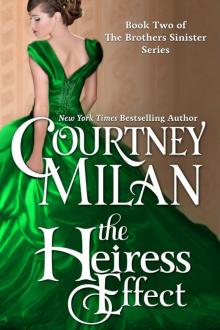 The Heiress Effect
The Heiress Effect Unraveled
Unraveled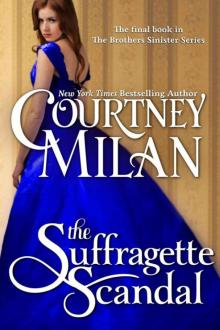 The Suffragette Scandal
The Suffragette Scandal The Year of the Crocodile
The Year of the Crocodile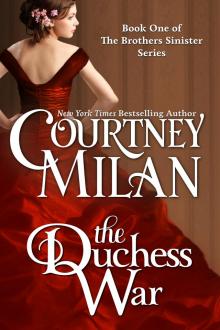 The Duchess War
The Duchess War What Happened at Midnight
What Happened at Midnight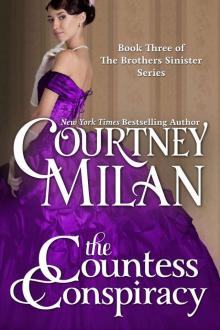 The Countess Conspiracy
The Countess Conspiracy Proof by Seduction
Proof by Seduction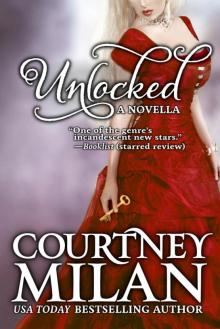 Unlocked
Unlocked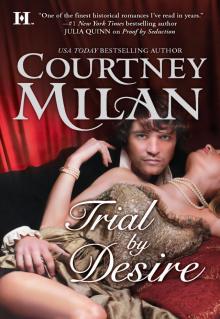 Trial by Desire
Trial by Desire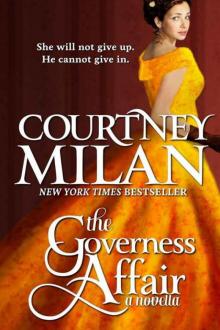 The Governess Affair
The Governess Affair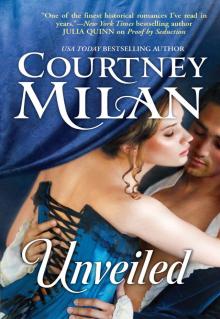 Unveiled
Unveiled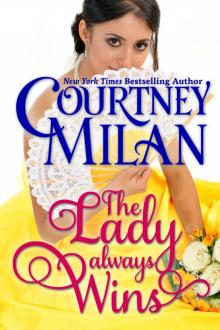 The Lady Always Wins
The Lady Always Wins Trade Me
Trade Me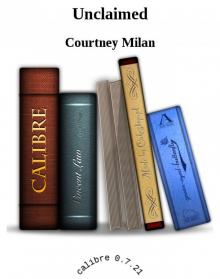 Unclaimed
Unclaimed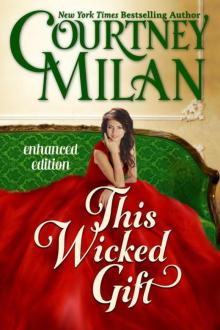 This Wicked Gift
This Wicked Gift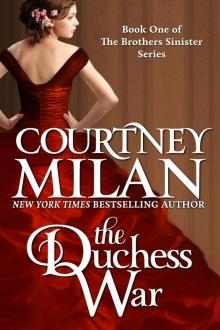 The Duchess War (The Brothers Sinister)
The Duchess War (The Brothers Sinister) Hamilton's Battalion: A Trio of Romances
Hamilton's Battalion: A Trio of Romances The Turner Series
The Turner Series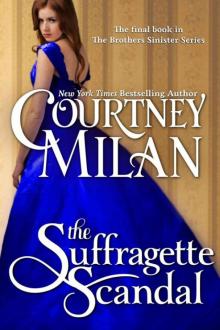 The Suffragette Scandal (The Brothers Sinister)
The Suffragette Scandal (The Brothers Sinister)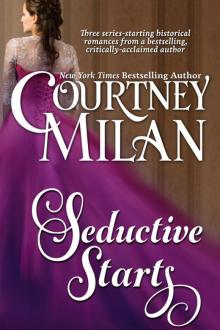 Seductive Starts
Seductive Starts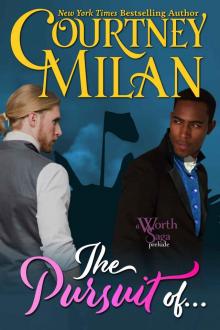 The Pursuit Of…
The Pursuit Of… Hamilton's Battalion
Hamilton's Battalion The Carhart Series
The Carhart Series Seven Wicked Nights
Seven Wicked Nights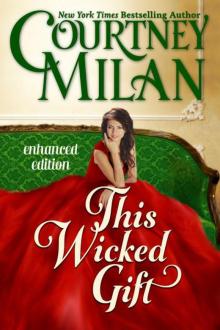 This Wicked Gift (A Carhart Series Novella)
This Wicked Gift (A Carhart Series Novella)